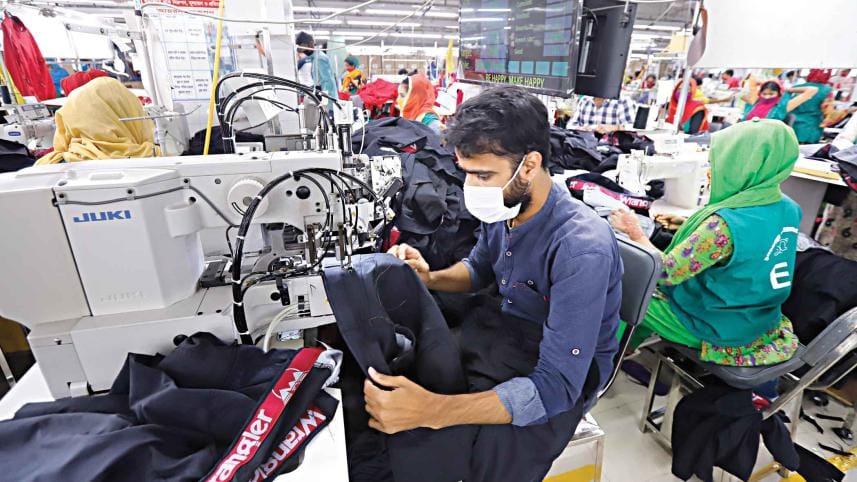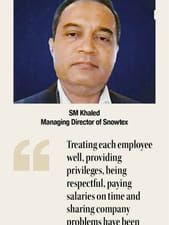A snowballing venture


SM Khaled, managing director of apparel exporter Snowtex Group, has always abided by two things in life: honesty and commitment.
These virtues, in his words, prompted him to take up a seven-day walk from Dhaka to Chattogram in his teenage years with seven schooltime friends as part of an anti-smoking campaign, which eventually got him a certificate right from the then president himself.
These principles also paid great dividends later in a career in apparel manufacturing.
After short stints at a garment factory and buying houses and three nearly botched attempts at forging partnerships, he established Snowtex in 1998 to supply accessories and trims to local clothing manufacturers.
"At first, Snowtex had one employee…and I used my home as an office. However, we gained limited success and started our own buying house and getting small orders," said Khaled.
In 2000, Snowtex got some orders from Berne Apparel, unlocking a mystery box of astronomical growth and success. Three years on, the US clothing brand made a partnership offer to establish a factory.
"In a few years Snowtex earned a few crore taka but it was not enough to establish a garment factory on our own," Khaled.
"But impressed with Snowtex's commitment and quality of products, Berne helped us with money to establish our first factory, Snowtex Apparels, in 2004," he said.
And this partnership led to the group owning three more factories, employing 16,000 people and generating an annual turnover of $250 million.
The second factory, Cut N Sew Ltd, was also established jointly with the Berne in 2009 in response to growing work orders.
Adopting modern, green and sustainable manufacturing concepts, Snowtex Outerwear was founded in 2014. Then came the group's wholly owned Snowtex Sportswear in 2019.
Products now range from a variety of jackets, purpose-based wear, vests, overalls, coveralls and bottoms.
The company lists some 50 countries as export destinations and buyers such as Decathlon, Columbia Sportswear Company, VF Corporation and BESTSELLER.
Dedicated to the task is an 11.50 lakh square-feet production floor sitting on over 20 acres of land in Dhamrai making use of 11,000 machines in 180 production lines.
A 2D and 3D computer-aided design section collaborates in cutting, printing, embroidery, welting, sewing and finishing, all with other technologically advanced machinery.
To ensure shipments make it out smooth, the company has its own inspection, clearing and forwarding (C&F) firm and logistics support.
Khaled also credited his success to trustworthy employees. "We never paid January's salary in February (till date)," he said.
He said his very first three employees were still there alongside a majority of his first factory's 800 staff. His employees view the company as an extension of their own family, he said.
Treating each employee well, providing privileges, being respectful, paying salaries on time and sharing company problems have been brought into practice.
Establishing his two Dhamrai factories necessitated loans of a few hundred crore taka.
"We never missed any deadline in repayment of loans. Snowtex still does business with the same bank with which it started dealing in 2004 and it's our only bank," said Khaled.
"We don't have to go to the bank and ask for anything because of the on-time payments. The bank itself wants to give us money and support. I have visited the bank only four or five times in the past 16 to 17 years," he added.
Snowtex Outerwear, a LEED (Leadership in Energy and Environmental Design), has been certified as a "Green Factory" by United States Green Building Council.
Adopting eco-friendly manufacturing principles, Snowtex uses a state-of-the-art 290kW rooftop photovoltaic power station, reducing its carbon emissions by approximately 85 per cent or 970 kilogrammes a day.
Other machinery in use reduce electricity consumption by up to 56 per cent annually.
"Every member is entitled to our medical care centre, day care centre for children, free lunch, attendance bonus, zero defect operator reward, maternity benefits, reward for best line, support for new employees, sanitary napkin, skill development training, sports and co-curriculum activity," said Khaled.
The company identifies employees suffering mental stress at the workplace utilising a happiness survey machine that makes the assessment through a couple of simple questions.
It received "Occupational Health & Safety Good Practice Award-2017" from the Ministry of Labour and Employment.
SaRa Lifestyle Earmarked for Future
At first glance Khaled seems a bit taciturn, but according to his associates he is proactive in command and has deep insight about the garment industry around the world, helping him to adopt transformations.
True to this, Snowtex launched retail clothing brand SaRa Lifestyle in 2018.
Khaled said France had garment factories in the thousands about 40 years ago which eventually shut down. In the past 20 years, many Taiwanese factories gradually shifted to China, when the sector was booming in 2010.
Now, China's garments factories are slowly closing down and moving to Bangladesh and other countries.
Many of Snowtex's buyers once had garment factories but they are now only clothing brands. Had this shift not been adopted, they would have gone out of business.
Keeping this in mind SaRa Lifestyle has been launched to provide quality products at low prices. It has witnessed 100 per cent annual growth and now has five outlets while another five were due by 2021.
"Our next plan is to establish SaRa as a multinational clothing brand and roll out its stores across the globe," added Khaled, who worked as a journalist at an English daily during his student life and worked at Bishwa Sahitya Kendra for several months after graduating from the University of Dhaka.
Fighting the Pathogen
Snowtex, like its peers, started feeling the pandemic's pinch since mid-January last year, when importing accessories from China turned difficult. "We know that gloomy days are ahead," said Khaled.
"…buyers were cancelling orders. One turned bankrupt and faced a Tk 20 crore liability. A few months later the orders rebounded. But it will be much less than the profit we were supposed to make this year," he said.
However, the company pivoted to making face masks and personal protective equipment (PPE).
"After March, PPEs became the most sought-after product and there is a scarcity of it everywhere," he said.
"Then we saw Marks & Spencer, Buet and BGMEA trying to make PPEs. We saw that we have all the machinery and raw materials that they were using to make it," he said.
Snowtex diverted 100 operators into making PPEs during the lockdown.
It gave away 17,000 PPEs worth Tk 1.36 crore in late March and beginning of April among hospitals, doctors, media houses and others in the frontline.
Snowtex has tested 10 types of fabric combinations to attain quality face masks. One reached an effectiveness of 72 per cent whereas most in the local market provide 20 per cent protection.
It has so far sold over 2 lakh face masks in the local market and exported 2.10 million pieces. Now it has come about a three-layer washable mask providing 86 per cent protection against pathogens.



 For all latest news, follow The Daily Star's Google News channel.
For all latest news, follow The Daily Star's Google News channel.
Comments